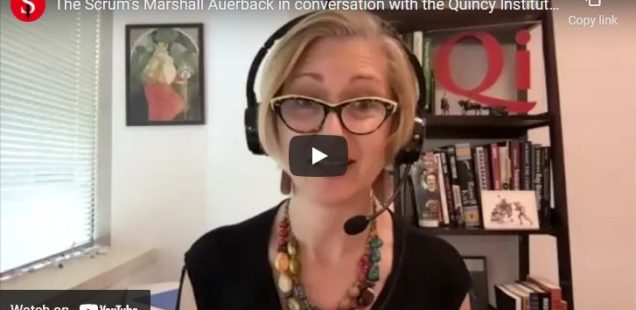
“‘The Blob,’ anatomized.”
An exchange with Kelley Vlahos.
We were delighted to be joined last week by the editor and journalist Kelley Vlahos for a Scrum webcast. Vlahos, editorial director of the online magazine Responsible Statecraft and senior advisor at the Quincy Institute, is one the most astute diagnosticians we have of how “the swamp” we know as Washington actually operates. Her close-to-the-ground insights take us several layers down from what is ordinarily visible to those outside the Beltway—and to many within it, indeed.
In the webcast offered here, Vlahos and Scrum co-founder Marshall Auerback take on a number of facets of the D.C. foreign policy “blob,” notably how the defense industry games the system and vacuums up taxpayer dollars with little to show in return. Citing the work of the great defense analyst Chuck Spinney, Vlahos and Auerback explore how bloated and counterproductive defense spending programs are protected by a three-sided alliance among the Pentagon, the arms makers, and Congress. The “normal laws of economy,” as Vlahos puts it, do not apply—the disastrously wasteful F–35 program among the best-known examples.
What is to be done?
As if to address this question, Kelley began by talking about Q.I.’s underlying philosophy. Quincy takes a trans-partisan approach to questions such as our endless wars and bloated defense budgets. There are plenty of liberals and conservatives alike who “object to promoting democracy at the barrel of a gun,” as Vlahos says, and it is Quincy’s intent to bring them under one roof.
Part of the role of Quincy and writers such as Vlahos is to influence prevailing opinion in Washington. And if that is the metric by which to measure success, Vlahos believes there is reason to hope, as the language of restrainers and anti-interventionists at times breaks through, at last. Vlahos is also encouraged to see progressive members of the House “holding Biden’s feet to the fire on arms sales to the UAE, to Saudi Arabia, and most recently to Israel, and they are willing to break with Biden over this.”
Kelley and Marshall close with a warning about the continuing strength of the foreign policy establishment as it argues for a “tough line” against China and Iran, while those who dare to argue for more nuance and more diplomacy do so at risk to their reputations.
In addition to her responsibilities at Q.I., Vlahos co-hosts a podcast called Crashing the War Party with the foreign policy writers Daniel Larison and Barbara Boland. Prior to Quincy, Kelley served as executive editor at The American Conservative.
—J.W.C.,
Washington.

